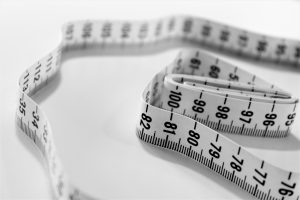
Losing weight is one of the most commonly set goals and is often one of the biggest reasons people hire personal trainers or coaches, join gyms or attend diet clubs.
Seeing the number dropping on the bathroom scales can be very motivating and can often be one of the signs that we are getting results. But measuring our body weight doesn’t help us identify any of the other positive changes that could be happening (such as losing inches and looking more toned).
If the number on the scale isn’t coming down as quickly as we think it should, we can become demotivated and frustrated.
For some of us, this can lead to an unhealthy relationship with the scales, basing happiness and feelings of self-worth on a number.
It can be really frustrating when we have made the effort to eat well and train hard, only to see that the scale hasn’t budged! This is especially the case when the only thing we are tracking is how much we weigh. What if we noticed that, although we hadn’t lost weight, our jeans were not as tight, or that we had lost an inch from our waist? Or even just that we had better energy levels?
Chances are we wouldn’t feel like our efforts were a waste of time and we’d feel more motivated to continue with the healthy habits that will ultimately lead us to reaching our goal.
When someone sets a goal of weight loss, what they really want is to lose fat. (Remember the body is made up of blood, bone, our organs, essential fat and muscle – they all make up the number on the scales).
So it’s useful to use a tape measure to track inch loss and to notice changes in how our clothes are fitting. You might like to take progress photos for yourself so you can appreciate the changes that occur over time.

The pitfalls of losing weight too quickly
Losing weight too quickly can be a bad thing because the quicker we lose weight, the more likely that we are losing muscle. Losing muscle will slow down our metabolism and will not lead to a ‘toned’ look.
Not only does losing weight too quickly not improve or potentially even worsen our body composition, a harsh calorie restricted diet just isn’t sustainable in the long run and can lead to an increased risk of ‘yo-yo dieting’.
Factors affecting body weight
Hydration status
Weighing yourself before and after drinking a litre of water can make a difference. After drinking a litre of water you can weigh 2.2lbs (1kg) more than before you drank it.
Salt intake
Sodium levels in the body can cause a fluctuation in body weight week to week
Stress
When we experience stress our bodies release cortisol and this can lead to an increase in anti-diuretic hormone. This hormone causes our body to retain water.
While exercise and healthy eating help to reduce our stress levels, excessive exercising and crash diets can actually be a major cause of stress, more reasons why attempting to lose weight too quickly can backfire.
Other issues that come with stress are the ways in which we try to cope with it. Many people use alcohol and food as ways to get some temporary relief. Of course, too many glasses of wine and takeaway meals are not going to help us reach our goals.
The menstrual cycle
Changes in hormone levels in the days leading up to the monthly period can cause an increase in fluid retention – which can appear as an increase in body weight of as much as 5lbs. This isn’t an overnight fat gain but it can lead to frustration and a reduction in motivation if we focus too much on the scales. This spike is only temporary and not a true reflection of overall progress.
Gaining muscle
Engaging in resistance training and increasing our protein intake can often lead to an increase in muscle mass. Remember muscle and fat weigh the same but muscle takes up less ‘space’ in the body leading to that toned look.
The scales may show a slower change in body weight but you are gaining muscle while losing fat. Your clothes will fit better, you’ll feel healthier and your metabolism will increase.
Other benefits to keeping on track and being more active include: an increase in strength, improved cardiovascular fitness, better energy levels, reduced stress levels, improved mood, clearer complexion and better sleep.

(The above was extracted and summarised from our eBook: Beyond the Scales: There's more to it than Weight Loss. Available here.)
